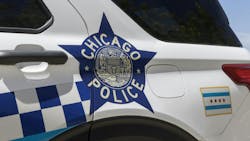Mayor Orders Chicago Police to Work with Protesters Clashing with Federal Authorities
What to know
-
Chicago Mayor Brandon Johnson signed an executive order Tuesday directing police to work with protest organizers when federal immigration enforcement actions disrupt demonstrations.
-
The order comes amid expanded ICE operations in the city, where recent protests have escalated into clashes involving non-lethal weapons.
-
Johnson did not provide details on how Chicago police will interact with federal agents but said the city intends to safeguard residents’ First Amendment rights.
Mayor Brandon Johnson is directing police to work more closely with protesters clashing with federal authorities as President Donald Trump ramps up deportations in and around Chicago.
Johnson signed an executive order Tuesday that orders Chicago police to “collaborate with protest organizers to develop a mutually acceptable alternative plan” when Trump-controlled law enforcement disrupts legal protest.
The mayor argued his order will bolster free speech rights as tense confrontations between Immigration and Customs Enforcement agents and protesters spread, and get the city ready if federal authorities “trample on the constitution.”
But when reporters pressed him Tuesday about how the order will change the way Chicago police respond to federal agents cracking down on protests against deportations, Johnson offered no specifics. He simply reiterated that protesters in Chicago should be able to express their First Amendment rights, without saying whether police officers would seek to stop federal agents from removing protesters or using “less lethal” anti-crowd weapons like tear gas or rubber bullets against them.
“If the federal government will not uphold this right, then the city of Chicago will,” Johnson said during a news conference after the signing. “We are going to protect people’s rights to get together, peacefully assemble, and push back against this form of tyranny.”
The measure is yet another effort by Johnson to push back against Trump’s Chicago actions and carefully position himself as a Trump opponent.
Trump has for weeks publicly toyed with the possibility of sending National Guard troops to Chicago to crack down on crime. He backed off the plans Friday as he announced he would instead direct troops to Memphis, then again Tuesday morning hinted he could soon send troops to Chicago after all.
But the president has remained firm in his promise to target the city with ramped up immigration law enforcement. The Department of Homeland Security coined its Chicago deportation surge “Operation Midway Blitz” last week, and Border Patrol chief Gregory Bovino dubbed an apparently separate effort “Operation At Large” Tuesday.
The undertaking has drawn protests throughout the region, from thousands-strong marches in downtown Chicago, to a march Monday night in Franklin Park, where an ICE agent shot and killed a man last week during a traffic stop.
For days dozens have demonstrated outside an ICE processing center in Broadview. During one of the standoffs on Friday morning, agents wearing gas masks fired non-lethal pepper ball bullets at a group of protesters who were blocking a vehicle gate.
To back up his executive order, Johnson cited that protest and the city’s long protest history, from the slavery abolition movement to the Haymarket affair.
“This order is about being proactive, as we saw what happened in Broadview a few days ago,” he said. “With the presence of ICE in our neighborhoods, we can expect Chicago residents to follow in the footsteps of generations of Chicagoans who came before them.”
Late last month, Johnson signed a separate executive order aimed at countering Trump. The wide-ranging, but largely symbolic order directed law enforcement against wearing masks in Chicago. It also directed city departments to coordinate their responses to federal agents or the presence of military personnel in Chicago and to submit regular public records requests to the U.S. Department of Homeland Security to obtain information on immigration enforcement.
Pressed on how his new policy would shape Chicago police action if protesters clash with ICE, Johnson said it would more clearly establish where protesters have the right to protest. He did not say how police would be directed to interact with ICE, a tacit acknowledgment of the limits to the city’s ability to block actions taken by Trump’s government.
Federal authorities arrested at least 17 people across the city and suburbs Monday. Immigrant advocates and officials say recent efforts to track federal agents have created a “patchwork understanding” of what’s happening, but that increased federal activity has still upended daily life, a trend seen in Mexican Independence Day celebrations last weekend that were quieter than years before.
_________________
©2025 Chicago Tribune.
Visit chicagotribune.com.
Distributed by Tribune Content Agency, LLC.
